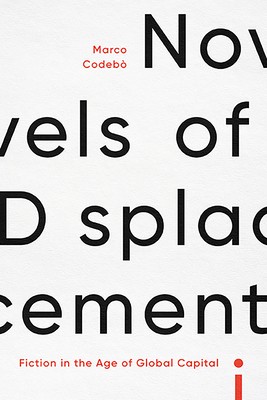
- We will send in 10–14 business days.
- Author: Marco Codebò
- Publisher: Ohio State University Press
- Year: 2023
- Pages: 216
- ISBN-10: 0814256023
- ISBN-13: 9780814256022
- Format: 15.2 x 22.9 x 1.2 cm, softcover
- Language: English
- SAVE -10% with code: EXTRA
Reviews
Description
In Novels of Displacement: Fiction in the Age of Global Capital, Marco Codebò assesses the state of fiction in our time, an age defined by the combined hegemony of global capital and software. Codebò argues that present-day displacement originates in the dualism of power that pervades our polarized society and in the sweeping deterritorialization that is affecting people, objects, and signs. As the ties between subjectivity and territory break, being in the world means being displaced. Rather than narrating how subjectivity can mark a place, novels of displacement convey the crisis of subjectivity's connection to place.
Using four works as case studies--Bernardo Carvalho's Nove noites, Daniel Sada's Porque parece mentira la verdad nunca se sabe, Zadie Smith's White Teeth, and Mathias ÃÂnard's Zone--Codebò investigates how globalization, displacement, and technology inform our understanding of subjectivity and one's place in the world. Coming from different literary traditions--Brazilian-Portuguese, Spanish, English, and French-- Novels of Displacement traces the development of displacement caused by organized crime, migration, and war. Ultimately what emerges from this study is evidence of how cultures of untruth damage but do not destroy human agency.EXTRA 10 % discount with code: EXTRA
The promotion ends in 21d.00:28:58
The discount code is valid when purchasing from 10 €. Discounts do not stack.
- Author: Marco Codebò
- Publisher: Ohio State University Press
- Year: 2023
- Pages: 216
- ISBN-10: 0814256023
- ISBN-13: 9780814256022
- Format: 15.2 x 22.9 x 1.2 cm, softcover
- Language: English English
In Novels of Displacement: Fiction in the Age of Global Capital, Marco Codebò assesses the state of fiction in our time, an age defined by the combined hegemony of global capital and software. Codebò argues that present-day displacement originates in the dualism of power that pervades our polarized society and in the sweeping deterritorialization that is affecting people, objects, and signs. As the ties between subjectivity and territory break, being in the world means being displaced. Rather than narrating how subjectivity can mark a place, novels of displacement convey the crisis of subjectivity's connection to place.
Using four works as case studies--Bernardo Carvalho's Nove noites, Daniel Sada's Porque parece mentira la verdad nunca se sabe, Zadie Smith's White Teeth, and Mathias ÃÂnard's Zone--Codebò investigates how globalization, displacement, and technology inform our understanding of subjectivity and one's place in the world. Coming from different literary traditions--Brazilian-Portuguese, Spanish, English, and French-- Novels of Displacement traces the development of displacement caused by organized crime, migration, and war. Ultimately what emerges from this study is evidence of how cultures of untruth damage but do not destroy human agency.

Reviews